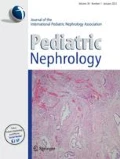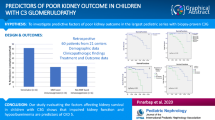Abstract
Background
The level of urinary cluster of differentiation 80 (uCD80) is elevated in most children with minimal change disease (MCD) as opposed to focal segmental glomerulosclerosis (FSGS) during the acute phase. The objective of this follow-up study was to evaluate whether uCD80 elevation is actually associated with MCD and whether it signals better prognosis.
Methods
We evaluated uCD80 levels and a series of putative progression factors in a cohort of 64 patients with nephrotic syndrome (NS) seen between 2011 and 2016. We monitored progression of chronic kidney disease (CKD), assessed as a glomerular filtration rate of < 90 ml/min/1.73 m2 for at least 3 months. Patients were classified according to uCD80 level and to the progression rate as calculated by Kaplan–Meier survival analysis and Cox’s regression analysis.
Results
During a mean follow-up period of 4.8 ± 0.6 (range 3.5–6.0) years, 13 children (20%) evolved to at least CKD stage 2. The 64 patients with NS and normal baseline renal function were divided into two groups based on uCD80 excretion, i.e. below or above a defined cutoff (< or > 328.98 ng/g creatinine). The predicted response to immunosuppression therapy was 34.5 and 100% in the low- and high-uCD80 excretion, respectively (p < 0.001). Progression to CKD was 41.4 vs. 2.9% in NS patients (p < 0.001). Using the Cox model, only uCD80 excretion (p = 0.013, relative risk 6.171) predicted progression to CKD.
Conclusions
Urinary CD80 predicts progression and remission in children with NS. The use of uCD80 as a prognostic marker facilitates the identification of high-risk patients at an early stage and may lead to better treatment selection.

Similar content being viewed by others
References
[No authors listed] (1978) Nephrotic syndrome in children: prediction of histopathology from clinical and laboratory characteristics at time of diagnosis. A report of the International Study of Kidney Disease in Children. Kidney Int 13:159–165
Garin EH, Diaz LN, Mu W, Wasserfal C, Araya C, Segal M, Johnson RJ (2009) Urinary CD80 excretion increases in idiopathic minimal-change disease. J Am Soc Nephrol 20:260–266
Garin EH, Mu W, Arthur JM, Rivard CJ, Araya CE, Shimada M, Johnson RJ (2010) Urinary CD80 is elevated in minimal change disease but not in focal segmental glomerulosclerosis. Kidney Int 78:296–302
Cara-Fuentes G, Wei C, Segarra A, Ishimoto T, Rivard C, Johnson RJ, Reiser J, Garin EH (2013) CD80 and suPAR in patients with minimal change disease and focal segmental glomerulosclerosis: diagnostic and pathogenic significance. Pediatr Nephrol 29:1363–1371
Mishra OP, Kumar R, Narayan G, Srivastava P, Abhinay A, Prasad R, Singh A, Batra VV (2017) Toll-like receptor 3 (TLR-3), TLR-4 and CD80 expression in peripheral blood mononuclear cells and urinary CD80 levels in children with idiopathic nephrotic syndrome. Pediatr Nephrol 32:1355–1361
Ling C, Liu X, Shen Y, Chen Z, Fan J, Jiang Y, Meng Q (2015) Urinary CD80 levels as a diagnostic biomarker of minimal change disease. Pediatr Nephrol 30:309–316
Ishimoto T, Cara-Fuentes G, Wang H, Shimada M, Wasserfall CH, Winter WE, Rivard CJ, Araya CE, Saleem MA, Mathieson PW, Johnson RJ, Garin EH (2013) Serum from minimal change patients in relapse increases CD80 expression in cultured podocytes. Pediatr Nephrol 28:1803–1812
Bhandari S, Ives N, Brettell EA, Valente M, Cockwell P, Topham PS, Cleland JG, Khwaja A, El Nahas M (2016) Multicentre randomized controlled trial of angiotensin converting enzyme inhibitor/angiotensin receptor blocker withdrawal in advanced renal disease: the STOP-ACEi trial. Nephrol Dial Transplant 31:255–261
Dagenais GR, Yusuf S, Bourassa MG, Yi Q, Bosch J, Lonn EM, Kouz S, Grover J, Investigators HOPE (2001) Effects of ramipril on coronary events in high-risk persons: results of the heart outcomes prevention evaluation study. Circulation 104:522–526
Dahlöf B, Devereux RB, Kjeldsen SE, Julius S, Beevers G, de Faire U, Fyhrquist F, Ibsen H, Kristiansson K, Lederballe-Pedersen O, Lindholm LH, Nieminen MS, Omvik P, Oparil S, Wedel H, LIFEStudy Group (2002) Cardiovascular morbidity and mortality in the losartan intervention for endpoint reduction in hypertension study (LIFE): a randomised trial against atenolol. Lancet 359:995–1003
ALLHAT Officers and Coordinators for the ALLHAT Collaborative Research Group (2002) Major outcomes in high-risk hypertensive patients randomized to angiotensin-converting enzyme inhibitor or calcium channel blocker vs diuretic: the antihypertensive and lipid-lowering treatment to prevent heart attack trial (ALLHAT). JAMA 288:2981–2997
Acknowledgements
We thank the staff of Beijing Children’s Hospital laboratory for technical assistance. This work was supported by the Capital Health Research and Development of Special Grant (No. 2016-2-2094), the Research on the Application of Capital Clinical Characteristics Program of Beijing Municipal Science and Technology Commission (No. Z161100000516106) and Beijing Municipal Administration of Hospitals’ Youth Programme (No.QML20171204).
Author information
Authors and Affiliations
Corresponding author
Ethics declarations
The study was approved by the institutional review board of the Beijing Municipal Science & Technology Commission and the Capital Medical University Institutional Review Board. All participants gave prior written informed consent.
Conflict of interests
The authors declare that they have no conflicts of interest regarding this study.
Rights and permissions
About this article
Cite this article
Ling, C., Liu, X., Shen, Y. et al. Urinary CD80 excretion is a predictor of good outcome in children with primary nephrotic syndrome. Pediatr Nephrol 33, 1183–1187 (2018). https://doi.org/10.1007/s00467-018-3885-7
Received:
Revised:
Accepted:
Published:
Issue Date:
DOI: https://doi.org/10.1007/s00467-018-3885-7




